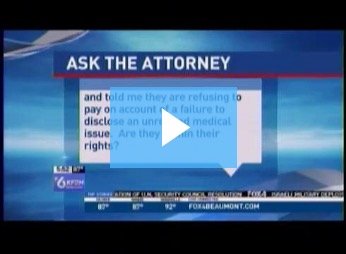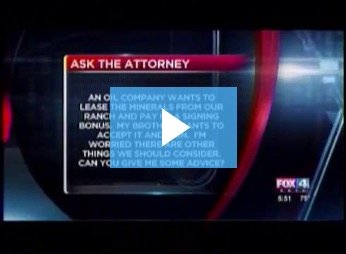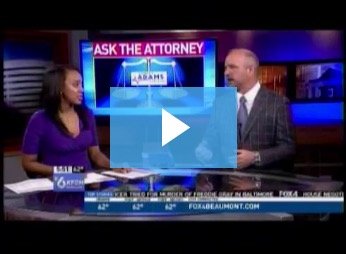Understanding Wrongful Death Claims in Texas
 Losing a loved one due to someone else’s negligence is devastating. In Texas, the law allows certain family members to file a wrongful death claim to seek justice and compensation for the loss of their loved one. If you have lost a loved one due to a fatal accident caused by another’s misconduct or negligence, understanding your legal rights is crucial. At Gilbert Adams Law Offices, we are committed to helping families in Beaumont and throughout Texas navigate the challenges of wrongful death claims.
Losing a loved one due to someone else’s negligence is devastating. In Texas, the law allows certain family members to file a wrongful death claim to seek justice and compensation for the loss of their loved one. If you have lost a loved one due to a fatal accident caused by another’s misconduct or negligence, understanding your legal rights is crucial. At Gilbert Adams Law Offices, we are committed to helping families in Beaumont and throughout Texas navigate the challenges of wrongful death claims.
What Is a Wrongful Death Claim?
A wrongful death claim is a civil lawsuit filed when a person’s death is caused by the wrongful act, neglect, carelessness, or intentional conduct of another party. These claims are designed to compensate the deceased’s surviving family members for the financial and emotional impact of their loss.
Although a suit for wrongful death may also involve a criminal act, wrongful death claims differ from criminal cases. While a criminal case can result in penalties such as imprisonment or fines, a wrongful death claim is a civil proceeding seeking financial compensation on behalf of the surviving family members. The burden of proof is lower in civil court and is based on a proximate cause or more likely than not. Additionally, in a civil case, the defendant(s) do not have the same constitutional protections that sometimes exist in criminal cases.
Who Can File a Wrongful Death Claim in Texas?
Under Texas law (Texas Civil Practice and Remedies Code § 71.004), only certain individuals are eligible to file a wrongful death claim. The statutory wrongful death beneficiaries include the surviving spouse, children of the deceased (including legally adopted children), and parents of the deceased. However, if none of these individuals file a claim within three months of the death, the personal representative (executor) of the deceased’s estate may file on behalf of the surviving family members unless explicitly prohibited by the family.
Common Causes of Wrongful Death Claims
Wrongful death claims arise from various types of fatal accidents, including:
-
Truck Wrecks and Motor Vehicle Accidents – Fatal crashes caused by simple negligence, including failure to follow traffic laws, reckless driving, speeding, or drunk driving. Texas has one of the highest rates of fatal car accidents in the country, making these claims particularly common.
-
Workplace Accidents –Employers have a duty to provide a safe work environment, and failing to do so leads to fatal workplace accidents, which is especially true in petrochemical refineries and plants, construction, railroad, maritime, and other industrial and commercial workplaces.
-
Defective Products – Dangerous or faulty products that cause fatal injuries. Manufacturers, designers, and distributors of dangerous or defective products can be held responsible for the damages of family members, including children, spouse, and parents.
-
Premises Liability – Slip, trip or fall accidents, assaults due to negligent security or deaths caused by unsafe property conditions can result in legal responsibility for the damages of the family members.
What Compensation Can Be Recovered in a Wrongful Death Claim?
In Texas, wrongful death damages are meant to compensate surviving family members for both economic and non-economic losses. These may include, for example, medical expenses related to the deceased’s final injury or illness, funeral and burial costs, loss of income and future earnings that the deceased would have provided, loss of companionship, love, and support, mental anguish and emotional suffering experienced by surviving family members, and loss of inheritance, which accounts for the resulting savings and wealth the deceased would have accumulated over time.
In cases of gross negligence or intentional misconduct, punitive or exemplary damages may also be awarded to punish the responsible party and deter similar dangerous actions in the future.
Factors That Affect the Value of a Wrongful Death Claim
The compensation available in a wrongful death lawsuit varies depending on several factors, including:
-
The deceased’s earning potential – Higher-earning individuals often result in larger claims for lost income.
-
The age and health of the deceased – Younger individuals with long career prospects may lead to higher claims.
-
The relationship between the deceased and the claimant – Spouses and minor children often receive larger damages due to dependency.
-
Circumstances of the death – If gross negligence or intentional harm played a role, punitive damages may be awarded.
-
Available evidence – Strong evidence, such as witness testimony, accident reports, and expert opinions, can strengthen a claim and maximize compensation.
Statute of Limitations for Filing a Wrongful Death Lawsuit in Texas
Texas law imposes a strict time limit, known as the statute of limitations, for filing a wrongful death claim. Generally, a lawsuit must be filed within two years from the date of the deceased’s death. Exceptions to this rule are rare, so it is essential to act promptly to protect your legal rights.
How a Wrongful Death Lawyer Can Help
Navigating a wrongful death claim can be difficult and even overwhelming, especially for family members who are grieving the loss of a loved one. Generally, a lawsuit is required to recover maximum recovery. An experienced wrongful death attorney can help by investigating the circumstances surrounding the death, gathering critical evidence to support the claim, negotiating with insurance companies to seek fair compensation, and representing your family in court if a fair settlement cannot be reached.
Insurance companies rarely offer to settle a wrongful death claim for the appropriate amount, as they don’t take into account the full extent of harm caused. At Gilbert Adams Law Offices, not only do we handle all legal paperwork and deadlines to ensure compliance with Texas law, but we take the time to identify all potential sources of liability and compensation to ensure your claim is maximally successful.
What to Do If You Suspect a Wrongful Death Case
If you believe your loved one’s death was caused by another’s negligence or misconduct, taking the following steps can help protect your ability to hold them responsible for the damages to you and your family members:
-
Gather Evidence – Keep any relevant documents, such as medical records, accident reports, and witness statements.
-
Document Financial Losses – Keep and record funeral expenses, medical bills, and lost wages.
-
Avoid Speaking with Insurance Companies – Insurance adjusters will try to minimize your loss and claim. Consult a lawyer before giving statements or accepting any offer.
-
Consult an Attorney – A wrongful death lawyer can evaluate your case, determine liability, and guide you and represent you through the legal process.
Contact Gilbert Adams Law Offices for Compassionate Legal Guidance in Texas
At Gilbert Adams Law Offices, we understand the immense pain and financial burden that comes with losing a loved one. Our dedicated legal team is here to provide compassionate support and aggressive advocacy to ensure you receive the justice and compensation you deserve.
If you have lost a loved one due to negligence in Beaumont, Southeast Texas, or anywhere in the state, contact us today for a free consultation. Let us help you hold the responsible parties accountable while you focus on healing and moving forward.










